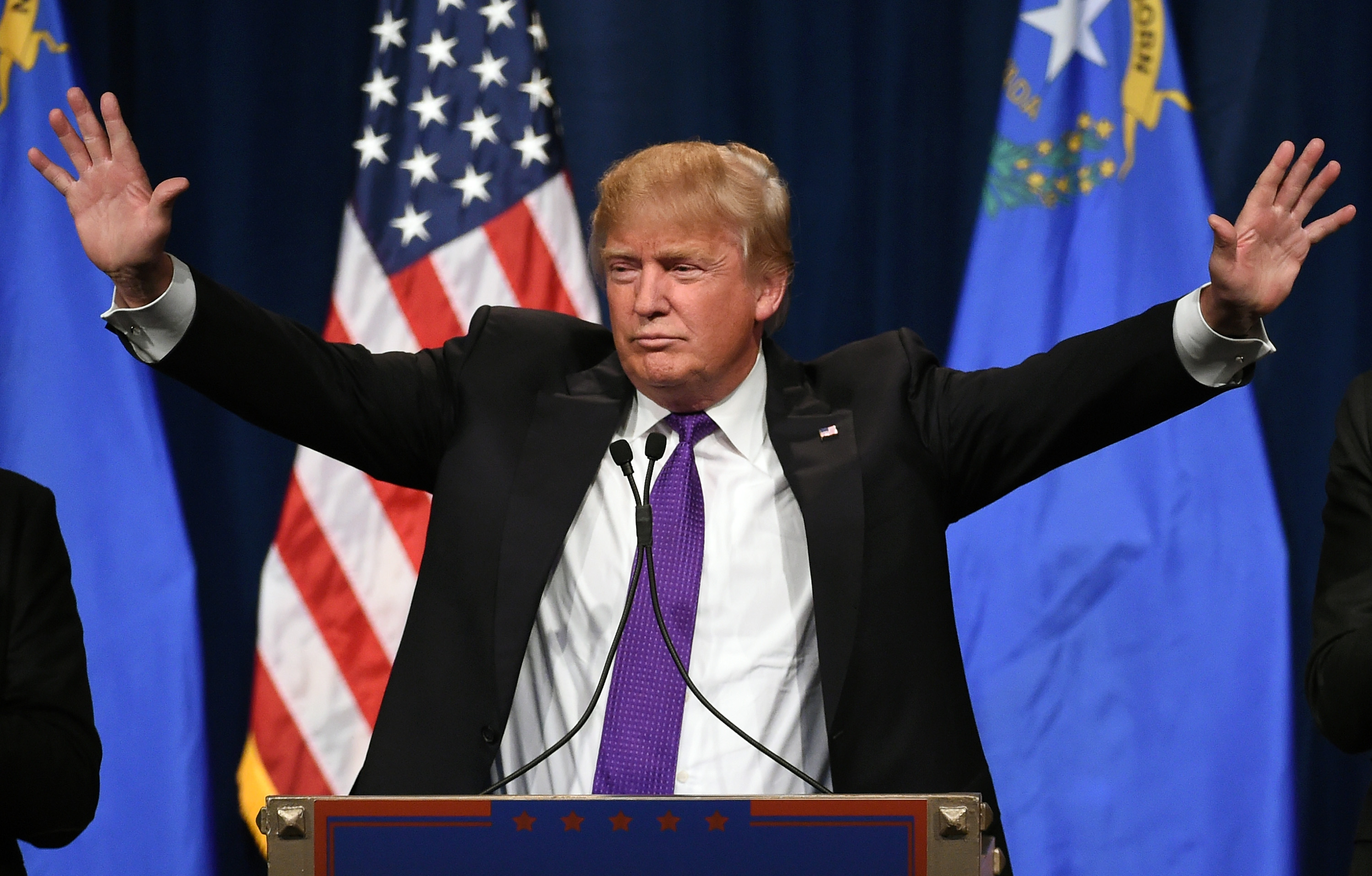Would a President Trump ruin America's foreign policy — or save it?
After Nevada, this is perhaps the most important question of Trump's candidacy


Donald Trump's blowout victory in Tuesday's Nevada caucuses — his third straight double-digit romp over his Republican presidential competitors — has thrown the GOP into an apparent crisis. Both Marco Rubio and Ted Cruz, supposedly the only viable competitors to Trump, are on the ropes, losing by more than 20 points to Trump. Trump has leads in most Super Tuesday contests. Who's going to stop him now?
It is time to take seriously the prospect of Trump's possible presidency — and the most compelling criticisms of it.
The most pressing issue is his power as president to wreck the rest of the world. It is a fact that Trump is more crudely oracular and unconvincingly sphinx-like on international relations than on any other issue. And where he is specific, it is hard to take him at his word. The net effect is that on foreign policy, he seems to be just winging it.
The Week
Escape your echo chamber. Get the facts behind the news, plus analysis from multiple perspectives.

Sign up for The Week's Free Newsletters
From our morning news briefing to a weekly Good News Newsletter, get the best of The Week delivered directly to your inbox.
From our morning news briefing to a weekly Good News Newsletter, get the best of The Week delivered directly to your inbox.
Well, you may say, America is resilient — deeply culturally sheltered from the destructive forces of democratization and globalization that have thrown so much of the globe into chaos. But the Mideast? The former Soviet space? East Asia? Africa? These places are fragile and dangerous in equal measure. They demand a degree of care and sophistication in policymaking that America does not.
Respected and trustworthy analysts are not sanguine about Trump's ability to supply what is needed worldwide. Peter Feaver, a Duke University professor of political science with experience in both the Clinton and (W.) Bush White Houses, recently made the following judgments: Trump's foreign policy promises will not come to fruition; he won't advance any new trade deals and much of what he does push will fail. What's more, his national security team will be "the least distinguished […] in modern memory. His administration will be hobbled by turnover, backstabbing, and other hallmarks of reality TV."
All bad — and plausible! — things. But then it gets worse. "Trump will isolate America from its allies and partners," adds Feaver (who supervised my undergraduate thesis). And, when he "gets in trouble, he will do something or say something that will embarrass the country." You probably don't need me to help you imagine how damaging these sorts of events could become.
But there is a sticking point in this case against Trump. The alternatives are not very appealing either. Given Hillary Clinton's track record on Russia, Libya, and Europe, it is very hard to put confidence in her ability to lead, avoid errors, correct for failures, and unite strong allies against daunting foes.
A free daily email with the biggest news stories of the day – and the best features from TheWeek.com
Marco Rubio, meanwhile, continues to distinguish himself as the most hysterical and hyperventilating candidate in the field on matters of national security and war. It is not just on domestic policy that he has clasped the Bush legacy in a suffocating bear hug. The point is not that neoconservatism stinks (it doesn't), but that Rubio's judgment on foreign affairs is as untested and immoderate as Trump's — if not moreso. Indeed, the one thing we know about Trump is he thinks Bush's foreign policy (in the first term, at least) was garbage, because it was produced in an echo chamber of abstract ideas foolishly delinked from reality. As dead-on as Feaver's warning seems to be, many Americans would be relieved to learn, however begrudgingly, that at least they could count on avoiding another Iraq, another Libya, or another Syria.
The national security establishment is tremendously powerful in the U.S. — sometimes for ill, but very often for tremendous good. It has many branches, filled with men and women of extreme dedication and great acumen. If Donald Trump is a complete idiot, he will rebuff these people and surround himself with the kinds of henchmen and amateurs who will guarantee that he goes down in history as failing beyond all measure to make America win again in the world.
Or perhaps Trump will take note of the foreign policy faceplant of well-intentioned novices like Jimmy Carter and staff the hell up on talent. Both the American people and the U.S. defense establishment are ready to turn the page on both Bush's and Obama's legacies abroad. In the most general and important sense, Trump offers that chance. He can screw it up royally, to be sure. (Presidents do!) But he can also have the sense, the savvy, and the pride to let our best civil servants throw their energies into a new grand strategy that actually works.
If you think Trump is now all but certain to ruin your country, the rest of the world is probably not high on your mind. But if you think America has been through far worse in the past, only for us to wind up far higher on top than so many of the planet's other peoples, you will likely agree that Trump's moment of truth will arrive — if it does — when the time comes to re-establish America's role in the world. At a moment when so little confidence has been placed in his rivals' ability to do just that, Trump likely faces a rare opportunity to make a global legacy Americans won't wear like an albatross.
James Poulos is a contributing editor at National Affairs and the author of The Art of Being Free, out January 17 from St. Martin's Press. He has written on freedom and the politics of the future for publications ranging from The Federalist to Foreign Policy and from Good to Vice. He fronts the band Night Years in Los Angeles, where he lives with his son.
-
 How the ‘British FBI’ will work
How the ‘British FBI’ will workThe Explainer New National Police Service to focus on fighting terrorism, fraud and organised crime, freeing up local forces to tackle everyday offences
-
 The best family hotels in Europe
The best family hotels in EuropeThe Week Recommends Top kid-friendly hotels with clubs, crèches and fun activities for children of all ages – and some downtime for the grown-ups
-
 Moon dust has earthly elements thanks to a magnetic bridge
Moon dust has earthly elements thanks to a magnetic bridgeUnder the radar The substances could help supply a lunar base
-
 The billionaires’ wealth tax: a catastrophe for California?
The billionaires’ wealth tax: a catastrophe for California?Talking Point Peter Thiel and Larry Page preparing to change state residency
-
 Bari Weiss’ ‘60 Minutes’ scandal is about more than one report
Bari Weiss’ ‘60 Minutes’ scandal is about more than one reportIN THE SPOTLIGHT By blocking an approved segment on a controversial prison holding US deportees in El Salvador, the editor-in-chief of CBS News has become the main story
-
 Has Zohran Mamdani shown the Democrats how to win again?
Has Zohran Mamdani shown the Democrats how to win again?Today’s Big Question New York City mayoral election touted as victory for left-wing populists but moderate centrist wins elsewhere present more complex path for Democratic Party
-
 Millions turn out for anti-Trump ‘No Kings’ rallies
Millions turn out for anti-Trump ‘No Kings’ ralliesSpeed Read An estimated 7 million people participated, 2 million more than at the first ‘No Kings’ protest in June
-
 Ghislaine Maxwell: angling for a Trump pardon
Ghislaine Maxwell: angling for a Trump pardonTalking Point Convicted sex trafficker's testimony could shed new light on president's links to Jeffrey Epstein
-
 The last words and final moments of 40 presidents
The last words and final moments of 40 presidentsThe Explainer Some are eloquent quotes worthy of the holders of the highest office in the nation, and others... aren't
-
 The JFK files: the truth at last?
The JFK files: the truth at last?In The Spotlight More than 64,000 previously classified documents relating the 1963 assassination of John F. Kennedy have been released by the Trump administration
-
 'Seriously, not literally': how should the world take Donald Trump?
'Seriously, not literally': how should the world take Donald Trump?Today's big question White House rhetoric and reality look likely to become increasingly blurred
